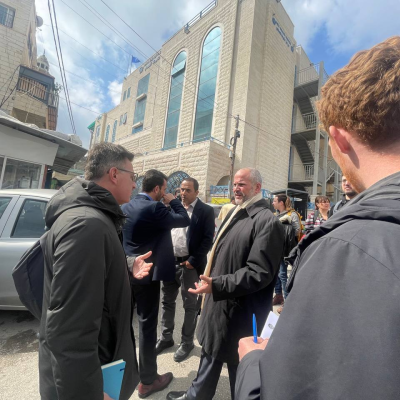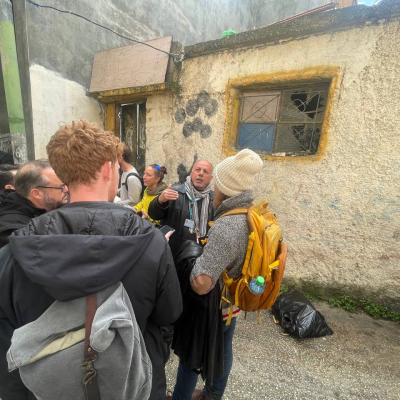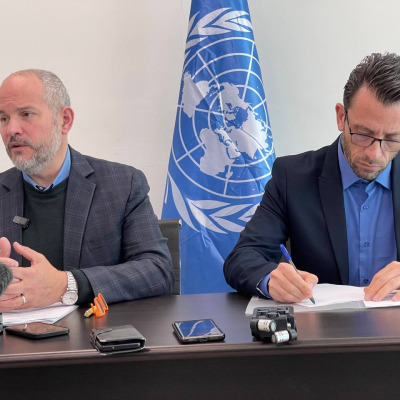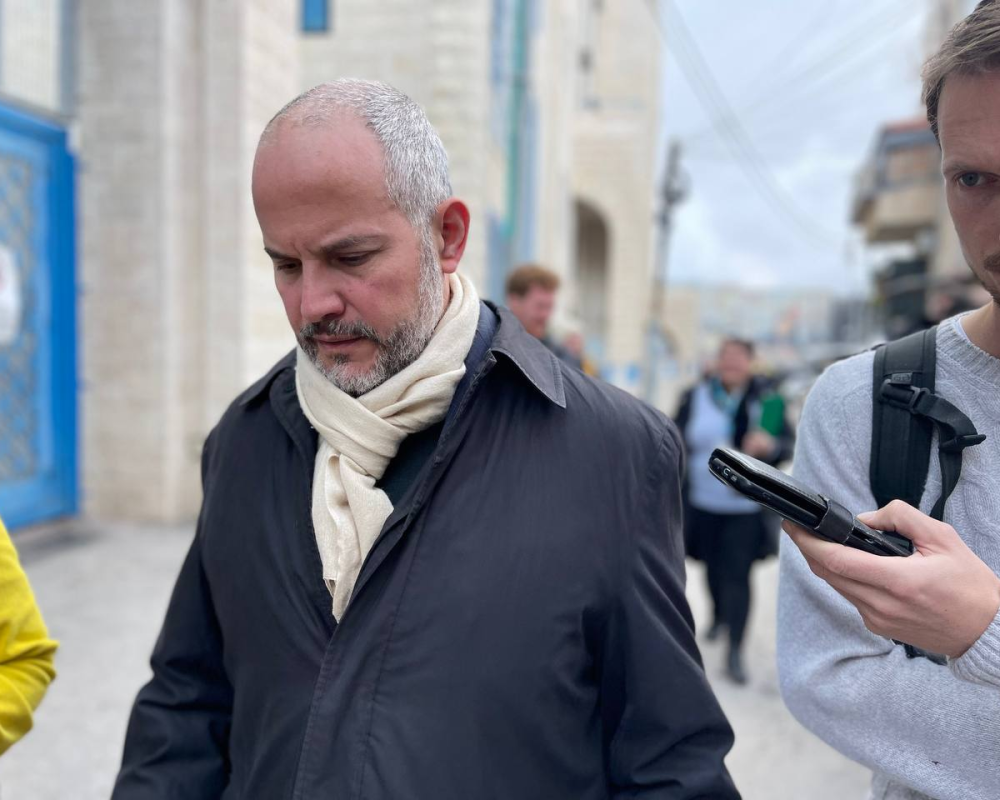
Bethlehem / PNN /
Adam Pollock, the Director of Operations for the United Nations Relief and Works Agency for Palestinian Refugees (UNRWA) in the West Bank, visited Aida refugee camp for Palestinian refugees and held a press conference where he discussed the difficult reality faced by the international organization he manages in the West Bank. He spoke to a group of foreign journalists working in international and regional agencies and newspapers.
The suspension of funding will lead to the collapse of UNRWA and the cessation of all its humanitarian services.
Adam Pollock, the Director of Operations for the United Nations Relief and Works Agency for Palestinian Refugees (UNRWA) in the West Bank, stated that the suspension or freezing of funding by the sixteen donor countries to UNRWA in the aftermath of Israeli accusations against some UNRWA employees of involvement in the events of October 7th, and the opening of a United Nations investigation into these allegations, affects the level of services in all the regions where the agency operates, including the West Bank, Lebanon, Syria, and Jordan.
Pollock responded to a question from the Palestine News Network (PNN) and stated that the expected scenario would be catastrophic, involving the cessation of all services provided by UNRWA if the financial collapse occurs. He pointed out that the refugees and the nineteen camps in the West Bank, in addition to the camps in other regions, would be without any services, meaning no schools, education, health services, medical vaccines for children, no social safety net, no infrastructure services, no water tests, no cleaning and waste collection services, and no payment of salaries for UNRWA employees in the West Bank, numbering 3,700 employees. Many of them support their larger families, and all of this will lead to humanitarian disasters in various camps if the situation reaches the scenario of a financial collapse, which is not far from us in a significant way.
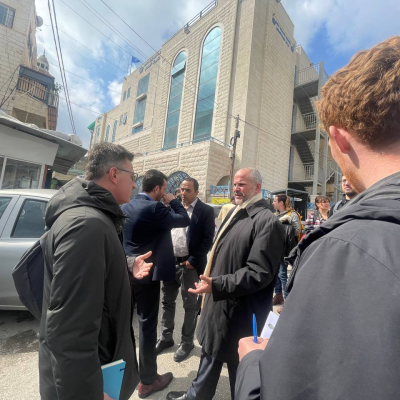
Pollock added that the financial situation of UNRWA has been difficult and poor in the last two years, but we did not expect the situation to deteriorate to this extent this year. The financial situation of the agency can be classified as the worst in its history even before the events of October 7th. The situation has become more difficult after what happened on this date. He emphasized the possibility of the agency resorting to monthly emergency plans, but he does not prefer to delve into the details at this time.
During his tour, the Director of Operations for UNRWA in the West Bank mentioned that they are engaging with donors to highlight the important role of UNRWA and the services it provides. They are also communicating with the media today to emphasize this crucial role of the relief agency and clarify that the absence of UNRWA and its services would result in a large number of Palestinians, potentially reaching 900,000 refugees in the West Bank camps, not receiving any of the services provided in the West Bank.
In response to another question from PNN, Pollock stated that UNRWA currently provides basic education services, vocational training, basic health services, cleaning services in the camps, solid waste removal, as seen today in Aida refugee camp in Bethlehem. Additionally, there are water treatment services and testing of clean drinking water provided by the agency. There are also social services, emergency assistance for the poorest of the poor in the camps, relief and shelter services for those whose homes have been demolished by the Israeli army. Moreover, there are relief and supply services for some Bedouin communities. All these services fall under the broader services provided by UNRWA, which could be affected or halted due to the financial situation.
"We are neutral, and our status cannot be changed."
The Director of Operations for UNRWA emphasized that the agency and its teams are neutral, and Israeli accusations are not new. However, linking them to the events of October 7th prompted some countries, especially those providing support to the agency, to freeze or suspend this support until investigations are completed. He explained that the Israelis are aware of their efforts and work. They are present on a mandate from the General Assembly to provide services to Palestinian refugees. They will continue with this presence until a just and lasting solution to the Palestinian issue and the refugee issue is achieved. They are here in accordance with the decisions of the United Nations General Assembly and have an international status protected by the force of international law. The presence of refugees and their status is established and recognized.
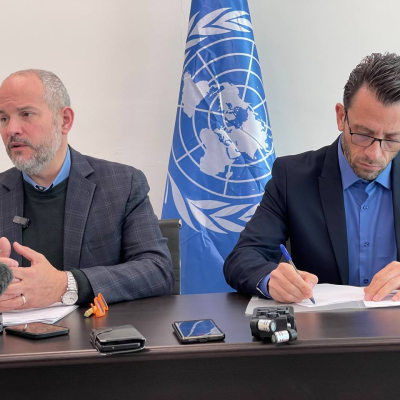
In response to questions from foreign journalists regarding Israel's dissemination of videos and names of UNRWA employees, Pollock stated that this falls within the framework of the media war on social media platforms by certain Israeli entities and organizations that do not want UNRWA to continue. He emphasized that the images published are old, confirming that there is an investigation initiated by the Secretary-General. They must wait for the results, noting that UNRWA is not part of the investigation administration and cannot provide any information about it. He expected the results to be issued in the coming weeks.
Regarding the demand from some countries to assign UNRWA's role to UN-affiliated organizations, Pollock said it is difficult to change UNRWA's status because it has the mandate and a decision from the international General Assembly of the United Nations. Additionally, the international organizations designated as potential alternatives to UNRWA reject such a proposal due to reasons related to the agency's international status. Moreover, the technical details and capabilities of these organizations differ from UNRWA's work. He emphasized that all UN-affiliated international organizations see UNRWA as the backbone of the international organization in the region.
Difficult conditions amid increasing incursions and unemployment
In his remarks to journalists, UNRWA's Director of Operations addressed the daily incursions into Palestinian refugee camps in the West Bank. He mentioned that 12,000 incursions were recorded in the past year in various areas of the West Bank. The Israeli army invades cities, villages, and Palestinian refugee camps. The consequences of these incursions are most catastrophic for the refugee camps. The army conducts raids, arrests, and sometimes demolitions of homes. Consequently, the losses are highest in the camps due to a new strategy employed by the Israeli army – the policy of road leveling. This involves the use of heavy equipment and bulldozers to level streets along with water, electricity, communication networks, and sewage systems under the pretext of security concerns about bombs and explosives. He noted that this leveling affects daily life and cited examples of areas where water, electricity, and communication services have been disrupted, and sewage has flowed. This strategy's most significant impact is on camps in Jenin, Tulkarm, Balata, and Aqbat Jaber, where officials describe Israel as waging a war on them, similar to its actions in the Gaza Strip.
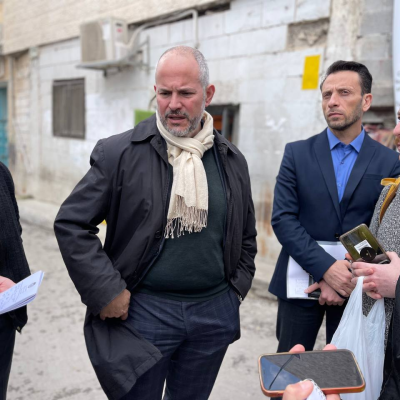
UNRWA's Director of Operations in the West Bank highlighted the dire economic conditions in the refugee camps after October 7, when the West Bank was closed, resulting in no internal economic activity. Many workers were laid off, leading to a lack of money inflow. Additionally, the Palestinian Authority is experiencing an economic crisis, contributing to increased unemployment among young people and men. Approximately 30% of young people in the West Bank are without work, and the unemployment rate has risen to as much as sixty percent according to chamber of commerce estimates, particularly in Jenin.
He mentioned that UNRWA is making efforts with various donors, holding fifteen meetings with representatives of supporting countries to convince them to reconsider decisions to stop or freeze funding for UNRWA. He expressed hope for new donors to come forward but warned of the possibility of making decisions that could lead to the absence of services. This could result in the anger of the Palestinian people if countries do not renew their funding.
He raised an important question: if UNRWA stops operating due to funding cessation, who will provide services to refugees in the face of ongoing occupation – the occupying state or the Palestinian Authority?
Israeli Violations against UNRWA Staff and Offices
Regarding the field situation and how Israelis interact with UNRWA and its staff in the West Bank, UNRWA's Director of Operations stated that some staff, including himself, have faced harassment from Israelis, both civilians and the military. He shared a personal incident where his car was kicked at a traffic light in Jerusalem a few days ago, and those who attacked his car accused him of being a terrorist supporting terrorists. He also mentioned an incident where a UNRWA team near a Bedouin gathering was subjected to assault, violation, and humiliating inspections at an Israeli checkpoint, being described as terrorists.
He also addressed a march organized by Israelis living in an Orthodox settlement near the UNRWA headquarters in Sheikh Jarrah. The deputy mayor of Jerusalem led the march, where they wrote slogans like "UNRWA equals terrorism" and demanded the expulsion of UNRWA offices from Jerusalem.
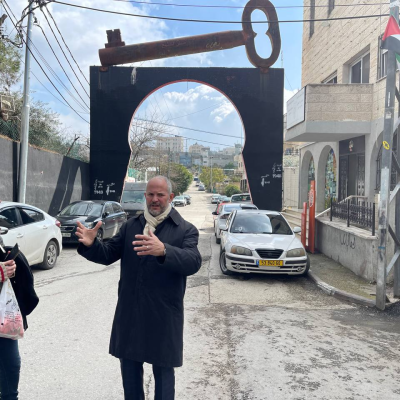
On the political level, he noted that some Israeli parties and politicians argue that there is no need for UNRWA in Jerusalem because there are no refugees in the city, which he emphasized is not accurate.
He pointed out the existence of four health centers and ten schools in Jerusalem, confirming that Israeli claims about the absence of refugees in Jerusalem are untrue. He provided examples such as the Qalandia Vocational Training Center, countering Israeli allegations that the land does not belong to UNRWA. He mentioned the presence of warehouses for food and aid provided to camps in the West Bank and Gaza. He also discussed decisions preventing staff from the West Bank from accessing the headquarters, indicating that these are Israeli obstacles to the work of the Relief and Works Agency. He emphasized that their work and presence are based on an international agreement, acknowledging that they operate in an occupied area and a host country.
"We work with donors to avoid a collapse of UNRWA because our financial situation is not as stable as it was in previous years. As we plan month by month, approaching March, there are concerns about a broader collapse of UNRWA services due to frozen funding," he added.
